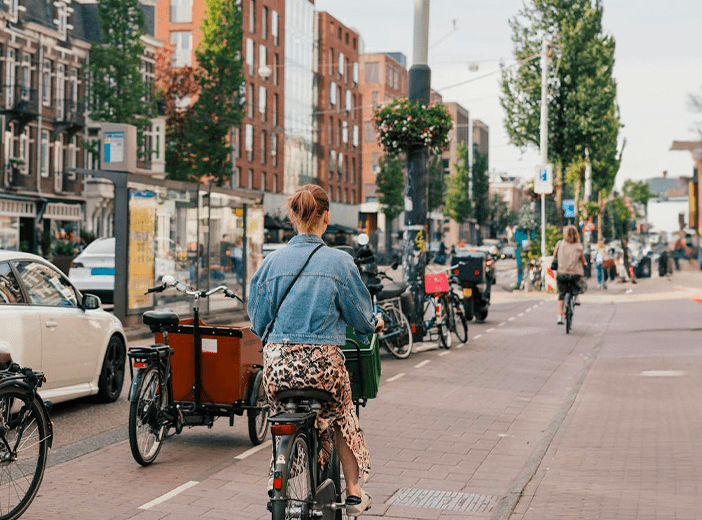Interview with Jack Hardinges from the Open Data Institute
Do cities have access to the private sector data they need to make efficient decisions? We interviewed Jack Hardinges, Policy Advisor at the Open Data Institute (ODI), to learn more about the ODI's work in this field.

What exactly is the ODI’s mission and how does your role fit in?
The ODI’s mission is to bring about a world where data works for everyone. To do this we work with companies and governments to build an open, trustworthy data ecosystem. As a Policy Advisor at the ODI, I help to shape our positions on the role of data in our society and economy, challenge the way we think about data, and drive practical changes in the way that organisations collect, share and use it.
Could you tell us about the work you do around smart cities?
As part of our ongoing R&D programme, we’re exploring the importance and value of making our cities open. The team are investigating the ways that cities apply principles of openness in practice – generally, we want those who steward data and those who create information from it to act in ways that lead to the best outcomes for everyone, and to avoid scenarios where we hoard or fear data. The aspect of the project I’m working on sets out to address the question: ‘do cities have access to the private sector data they need to make efficient decisions?’.
In your experience, what data cities rely on to become smarter?
There are a couple of things to unpack here. We’ve found that many cities are being sold a vision of ‘smart’ by technology vendors whose goals do not always align with the priorities of city authorities or its citizens. At the ODI we prefer to talk about ‘openness’ rather than ‘smartness’, as we believe it is open approaches to data, decision-making, innovation and everything in between that will help make cities better for the people and organisations within them.
Our research has found a number of cities trying to access data generated by transport services, like ride-sharing and micro-mobility services such as dockless bikes and scooters. In some cases cities would like to use this data to inform policy-making and planning; in others they are seeking to make reference data about available vehicles open for others to use to build into their services. Using air quality sensor data to better understand and tackle pollution, as in Bristol, is another area that cities seem to be focusing on and also engaging citizens to take part in.
Although they have some common challenges and interest in particular types of data, cities also have their own, very specific problems and needs. Open approaches can help ensure that these local needs are addressed. In the past we’ve worked with local councils and service designers in the UK to show how better use of data can streamline processes, provide information to citizens, and make data available to innovators and service providers.
Can you identify any obstacles when cities try to access this type of data?
A city’s data infrastructure consists of data that is managed by public institutions such as housing and transport authorities, as well as data collected and held by private and third sector organisations that operate within them. A big part of cities becoming more open is them – and others, such as civil society, journalists and startups – being able to access the private sector data they need. This isn’t the default, though. We’ve found that a lack of access can be the result of different obstacles, including the result of short-sighted procurement policies and agreements with companies to deliver public services, dismissive attitudes of private sector organisations towards cities’ demands for data, and quarrels around new laws designed to enforce data sharing.
Another big challenge is finding the appropriate level of access to data. Where cities seek to access private sector data, there can be a tendency to push for as much data as possible rather than considering the risks and specific uses it can be put to. Some uses might require granular, real-time like planning or research, can be satisfied by aggregate data collected over a period of time. Bundling very different uses of the data together not only gives private sector organisations a legitimate reason to turn down requests for data, but will ultimately lose citizens’ trust and their willingness for data about them to be used. Cities should be very clear about what data they need and why.
Do cities and private companies manage to work together to collect and use relevant data?
It seems to be a real mixed bag. In the past we’ve documented a number of examples of data flowing between public and private sector organisations in order to support the delivery of services. In our recent research we’ve come across more examples of cities and private sector organisations working together, like Amsterdam City Council’s ‘sensor registry’ that encourages companies to reveal the location of their Wi-Fi connected sensors on a public map.
Conversely, we’ve found signs of a lack of collaboration in others, such as city policymakers commissioning research based on convoluted hacks – scraping public adverts for short term lets or sending students to catch rides en masse – just to understand what’s happening within their cities. Again, battles in court between cities and private sector organisations, in part over access to data, are also a sign of the relationship not working as effectively as it could.
The ODI recently launched a participatory research and development project designed to support cities to become more open
What do you hope to achieve with this initiative?
We want to explore the importance and value of making our cities open. Over the past couple of months we’ve been researching the different ways that cities consider openness and where they have put it into practice, including through access to private sector data. We set up an open Google Doc inviting people to contribute examples, and have so far interviewed representatives of Gdansk, Helsinki, Hamburg and Amsterdam. Ultimately, we want to use what we’ve learnt in this project to develop guidance or a toolkit that helps cities become more open in their approaches. We’ll also continue to share our thoughts and findings as we go!




